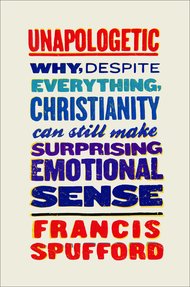Francis Spufford’s book, Unapologetic, isn’t the type one might review for a Christmas gift. He begins: “My daughter has just turned six. Some time over the next year or so, she will discover that her parents are weird. We’re weird because we go to church.”
 This book is not the sort of writing expected of Christians. It isn’t just that the book contains a lot of four letter words not usually found in books written by Christians. It’s also, as Spufford says, not an “apologia,” a defense of Christian ideas. It’s a defense of Christian emotions “of their intelligibility, of their grown-up dignity.”
This book is not the sort of writing expected of Christians. It isn’t just that the book contains a lot of four letter words not usually found in books written by Christians. It’s also, as Spufford says, not an “apologia,” a defense of Christian ideas. It’s a defense of Christian emotions “of their intelligibility, of their grown-up dignity.”
Older Christians may look askance at Spufford’s unorthodox treatment of Christianity. Younger Christians on the verge of giving up Christianity may find it refreshing.
Christianity calls for perfection, Spufford says. Since none of us is perfect, we are all failures. The flip side of this belief is that it’s very realistic. Any brand of Christianity that attempts to “circle the wagons of virtue” against the others has it wrong. We are the others. We’re all messed up. (He uses another word.)
From the beginning of Jesus’ group of disciples, Christians are a community of the messed up. The one hope is that Jesus really is a God of love like he said, who’s willing to work with his people, comfort them, lead them. It makes perfect sense that messed up people go to him.
Doubt is accepted as normal in today’s mixed mash of competing cultures and religions and no religion. Spufford emphasizes the Jesus who remains as he has always remained throughout Christianity’s spread through diverse cultures and ages. The Anointed One, God in his creature’s image, come to live among the creatures. The one we begin to know by faith.

